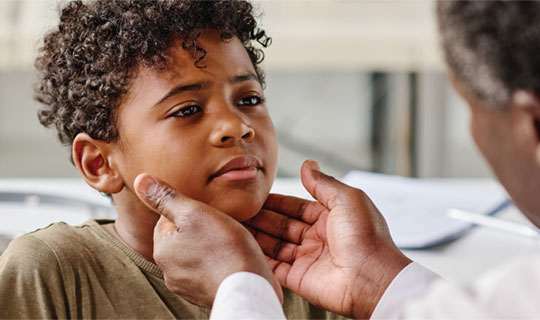
 Renuka Verma, MD
Renuka Verma, MD
Section Chief Pediatric Infectious Disease, Monmouth Medical Center
Group A strep, Streptococcus pyogenes (GAS) causes infections such as strep throat and impetigo. GAS can cause both noninvasive and invasive disease, as well as non-suppurative sequelae. These bacteria cause approximately 11,000–24,000 cases of severe (invasive) GAS disease, such as necrotizing fasciitis, in the United States each year. Each year, about 1,200– 1,900 people die due to invasive GAS disease.
Even though viruses cause most pharyngitis, GAS causes: 20% to 30% of sore throats in children, and 5% to 15% of sore throats in adults. The symptoms of GAS pharyngitis are usually self-limited, however, acute rheumatic fever and suppurative complications (e.g., peritonsillar abscess, mastoiditis) are more likely to occur after an untreated infection. Antibiotic treatment shortens the duration of symptoms, and reduces the likelihood of transmission to family members, classmates, and other close contacts. Patients, regardless of age, who have a positive RADT or throat culture need antibiotics. Clinicians should not treat viral pharyngitis with antibiotics.
Who Should Be Tested for Strep A Infection With Rapid Testing?
Patients with following feature are more like to have acute Streptococcal A infection
A patient with Sudden onset of sore throat, and
- Age 5–15 years
- Fever
- Headache
- Nausea, vomiting, abdominal pain
- Tonsillo-pharyngeal inflammation
- Patchy tonsillo-pharyngeal exudates
- Palatal petechiae
- Anterior cervical adenitis (tender nodes)
- Winter and early spring presentation
- History of exposure to strep pharyngitis
- Scarlatiniform rash
Who Should Not Be Tested with Rapid Strep A Test?
Children with presumed viral infection will have associated,
- Conjunctivitis
- Coryza (runny nose)
- Cough
- Diarrhea
- Hoarseness
- Discrete ulcerative stomatitis
- Viral exanthema
Testing for GAS pharyngitis is not recommended for children or adults with acute pharyngitis with clinical and epidemiological features that strongly suggest a viral etiology (eg, cough, rhinorrhea, hoarseness, and oral ulcers; strong, high).
Diagnostic Studies for GAS Pharyngitis Are Not Indicated
- for children <3 years old, because acute rheumatic fever is rare in children <3 years old and the incidence and classic presentation of streptococcal pharyngitis are uncommon in this age group.
- Selected children <3 years old who have other risk factors, such as an older sibling with GAS infection, may be considered for testing.
- Follow-up post treatment throat cultures or Rapid antigen detection test for GAS (RADT) are not recommended routinely.
- Diagnostic testing or empiric treatment of asymptomatic household contacts of patients with acute streptococcal pharyngitis is not routinely recommended.
- Post-treatment throat cultures are indicated only for those at particularly high risk of Acute Rheumatic Fever (ARF).
- Patients with repeated episodes of pharyngitis at short intervals in whom GAS infection is documented by culture or rapid antigen or nucleic acid amplification test, they are chronic GAS carriers experiencing frequent viral illnesses for whom repeated testing and antimicrobials are unnecessary.
- In assessing these patients, inadequate adherence to oral treatment also should be considered.
- Testing asymptomatic household contacts usually is not helpful. However, if multiple household members have pharyngitis or other GAS infections, simultaneous cultures of all household members and treatment of all positive test results may be of value.
Treatment for Acute Strep A Pharyngitis
S pyogenes is uniformly susceptible to all beta-lactam antibiotics (penicillins and cephalosporins). This is the reason there is no routine sensitivity testing for Strep pyogenes. Streptococcus A bacteria may have resistance to clindamycin or azithromycin.
- Penicillin V is the drug of choice for GAS pharyngitis. Prompt administration of penicillin shortens the clinical course, decreases risk of transmission and suppurative sequelae, and prevents ARF, even when administered up to 9 days after illness onset.
- Amoxicillin, orally as a single daily dose (50 mg/kg; maximum, 1000–1200 mg) for 10 days, is as effective as penicillin.
- An oral macrolide (eg, erythromycin, azithromycin, or clarithromycin) also is acceptable for penicillin–allergic patients. This should not be used in patients who can take a beta-lactam agent.
- Therapy for 10 days is indicated, except for azithromycin, which is given for 5 days. GAS strains resistant to macrolides have been highly prevalent in some countries and have resulted in treatment failures. Testing for macrolide resistance may help to decide the best antimicrobial agent for specific penicillin-allergic patients.
- Tetracyclines, sulfonamides, and fluoroquinolones should not be used for treating GAS pharyngitis. (Please refer to The Harriet Lane Handbook for drug dosing.)
The ASP, representing pediatric providers, including pediatric infectious disease specialists and pharmacists, exchange ideas, discuss case management strategies and develop and implement guidelines to be shared system wide, as well as serve as a resource for community physicians.
For more educational information, research and best practices from the Children’s Health Network at RWJBarnabas Health, visit rwjbh.org/childrenshealthresearch.
Resources
http://publications.aap.org/redbook/book/chapter-pdf/1630553/rbo2024_s3_018_010_en.pdf
Clin Infect Dis. 2012;55(10):e86-e102
N Engl J Med 2011;364:648-55.